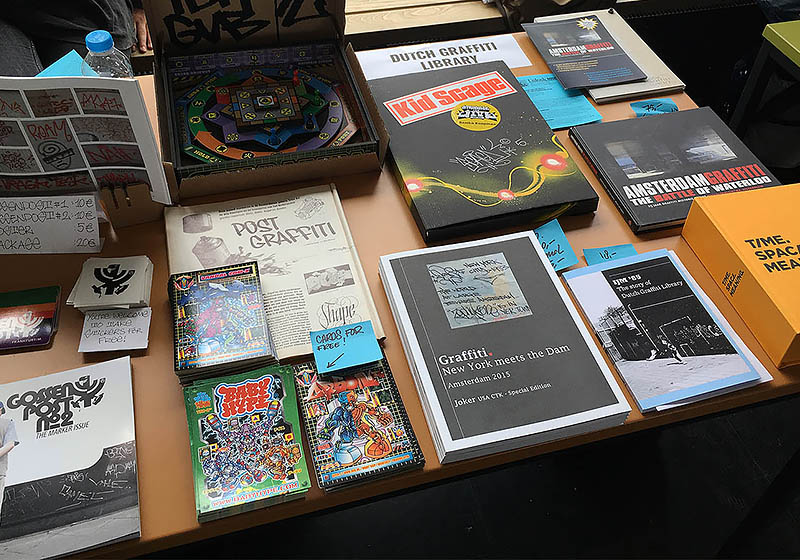
Last september Berlin hosted the second instalment of the Unlock Book Fair, the international publishing fair dedicated to graffiti and street art. Dutch Graffiti Library was represented. The event brought together again a good part of the European independent scene, with 35 publishers from all over the continent — from Portugal to Russia and from England to Greece. The American continent was also represented with the presence of a Brazilian publisher and a good number of North American publications.
Article by Javier Abarca – Spain, Founder and director Unlock
Images by Dutch Graffiti Library
Unlock took place in a very special space, the glass room at the ExRotaprintculture center, in the Wedding area. An airy space full of natural light with panoramic views of green areas — quite different from the claustrophobic spaces that often host events of this kind. Both the publishers and the numerous public enjoyed an exceptional environment in which to connect with each other and study the countless publications gathered at the fair.
This year Unlock had a focus on North American railroad cultures, especially hobo culture, train hopping, and boxcar art or moniker graffiti. The fair’s program was full of books, magazines, lectures and documentaries about the field. Several related European projects came with their publications, among them the obscure and respected French train hopping collective 4th, who publish under the imprint Croatan Edition.

The Unlock team took the opportunity to stock our Unlock Showcase travelling bookstore with a selection of rare and independent North American publications focused on different topics within the field. The display included numerous gems, among them fanzines by Adam Void, artist books from Colossus of Roads, and publications as fascinating as Railroad Semantics, the new edition of Mostly True, or the projects from the Black Butte Center for Railroad Culture. The Unlock Showcase was produced with the help of Bombing Science, who took care of the overseas shipment logistics from their Canadian headquarters.
But the central feature of the Showcase was the book edited for Unlock by Susan Phillips, Thomas Chambers and Javier Abarca, entitled Tramp Directories, Noms-de-Road and Unwritten Codes. An unprecedented publication that brings to light the most unknown and interesting graffiti culture to have existed: the hobo graffiti from the late 19th and early 20th Centuries. The book features excerpts from novels by North American authors Jack London and Leon Ray Livingston, better known by his moniker “A–No.1”, ubiquitous in the railroad landscape of that era. Both authors recounted in their writings their experiences as hobos and train hoppers, and as prolific taggers. The book features also illustrations taken from A–No.1’s books, newspaper clippings from the time describing his graffiti feats, and with images taken from a mind-blowing and groundbreaking collection recently rescued from the trash: a series of photographs from 1969 capturing tags from the late 19th and early 20th Centuries, carved on a wooden shack by the railroad tracks of Red Bluff, California, by several hobos mentioned in Jack London’s texts, by London himself, and by A–No.1. The book has been published under the imprint Urbanario Libros and will soon be available at the Urbanario website and at the Berliner online bookstore Hitzerot.

This year Unlock once again hosted a complete program of lectures, book launches and live performances. We were privileged to enjoy talks by the respected North American authors Carlo McCormick and Susan Phillips, and book launches by figures such as French artist Psyckoze. But the most exciting moment was probably the closing ceremony, a dance act inspired by the motions of tagging performed by choreographer and calligrapher Kadir “Amigo” Memis, a legendary member of the local scene.
In addition to the publishing-related program, this year Unlock expanded its range towards the audiovisual field. The screenings program of Unlock Video took place at Wendel Cafe, in Kreuzberg, and was programmed in partnership with the Tag Conference, also produced by the Unlock team. The Tag Conference was the first academic event focused on tagging, and was held for two days at at the Freie Universität right before the Unlock fair. The conference was a success, both in the public turnout — the room was consistently packed, uncommon in events of this kind — and in the amount and quality of the contributions, delivered by speakers coming from North America, Australia and all over Europe. In keeping with the topic of the Tag Conference, the Unlock Video program was focused on tags. Among the screened films were feature-length documentaries on hobo culture such as the influential Who is Bozo Texino? by Bill Daniel, and the lesser-known but also highly respected Long Gone by Jack Cahill and David Eberhardt. The Swedish movie Nug: Vandal in Motion completed the program of feature films. Numerous short movies were screened, among which stood out the premiere of Mais Rapel Urbano, produced specially for Unlock by Brazilian videographers SP Vandalismo and Escrita ABC. The film portrays the spectacular pixação tagging produced in São Paulo using precarious rappel techniques. Some films were screened at the Freie Universität, among them the priceless 16mm recording that accompanies the 1969 photographs included in the book Tramp Directories, Noms-de-Road and Unwritten Codes. Also at the university, and as a form of homage, a selection of films by the recently lost French artist Saeio were screened — the artist agreed to contribute his work to the event shortly before passing-away.

A most heartfelt thank-you to Javier Abarca and the rest of the volunteers, to all participants and to the public for making possible this latest instalment of the Unlock Book Fair!
Dutch Graffiti Library
